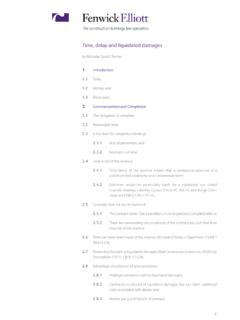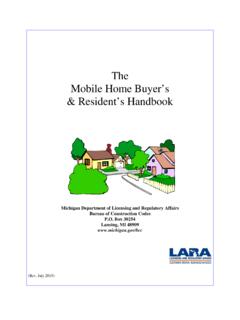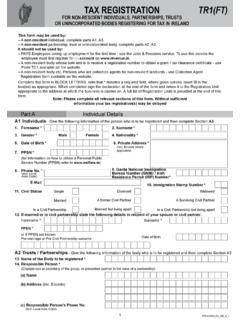Transcription of Construction Law: Contracts & Dispute Management ...
1 1 Construction Law: Contracts & Dispute ManagementSuccessful contract drafting and Management techniques by Nicholas Gould, Partner1 The purpose of this seminar is to Choice of law and forum; Key practical differences between common and civil law; Good Faith obligation in common and civil law; drafting tricky clauses: delay and extension of time, caps & limitation of liability, termination, liquidated damages; Ensuring that Dispute avoidance and resolution clauses are effective; How to successfully draft Contracts which represent good value for money;2 Choice of law and The interpretation and effect of contractual terms can vary significantly depending on the law that governs them. It is therefore important that the choice of which law should govern the contract is clearly Commercial relationships increasingly have an international flavour.
2 Parties are often based in different countries or their activities take place abroad. Consequently, questions of jurisdiction and governing law have an increasing prominence during contractual negotiations and in subsequent The Rome I Regulation, which came into force on 17 December 2009, applies to all Contracts which were concluded on or after that date in all EU Member States, except Denmark1. In particular, the Rome I Regulation provides that where there is an express agreement as to the choice of law, the courts of all EU states (except Denmark) will uphold and apply that choice. Criteria for selecting the applicable law would With which law are the parties most familiar? Which law offers the parties the most certainty in relation to key aspects of the contract ?
3 Where will the contract be performed, if different from the location of the parties? Which law will give the most beneficial outcome? Obviously, this may be different for each of the Which jurisdiction and Dispute forum have the parties selected for Dispute resolution?1. Prior to the 17th December 2009, the Rome Convention applied and had broadly the same principles as the Rome I contract drafting and Management It is eminently sensible for parties to select the law which will apply to their contractual obligations. Otherwise, it will be difficult for them to determine what their rights and obligations are, both when drafting and complying with the contract . Those rights and obligations will depend on the governing law which, in the absence of an express choice, may not be It is rare for commercial parties not to agree a governing law clause.
4 Where they omit to do so complex rules exist to determine what the governing law of the contract should be. Where parties are located, or obligations are to be performed, in different jurisdictions, determining the governing law of the contract may be difficult. This may lead not only to uncertainty but also to time and cost being spent arguing at the outset of any Dispute over what law should be The problems which can arise in this regard are highlighted by the comments of Mr Justice Mann in the case of Apple Corps Ltd v Apple Computer Inc2 In that case a Dispute arose in relation to an agreement which did not contain either a governing law or jurisdiction clause. Mr Justice Mann noted that: The evidence before me showed that each of the parties was overtly adamant that it did not wish to accept the other s jurisdiction or governing law, and could reach no agreement on any other jurisdiction or governing law.
5 As a result, [the relevant agreement] contains no governing law clause and no jurisdiction clause. In addition, neither party wanted to give the other an advantage in terms of where the agreement was finalised. If their intention in doing so was to create obscurity and difficulty for lawyers to debate in future years, they have succeeded handsomely. A choice of law governing a contract must be made expressly or must be clearly demonstrated by the terms of the contract or the circumstances of the The parties can choose the law applicable to the whole or to part only of the contract . The parties are also free at any time to change their choice of law governing the contract . Any such change will not prejudice the formal validity of the contract or adversely affect the rights of third The parties can choose the law of a particular country as the governing law of the contract even if all elements relevant to the situation at the time of choice are located in a different country.
6 Nevertheless, there are certain limitations in such Firstly, the choice made by the parties will not exclude the application of provisions of the law of the relevant country which cannot be derogated from by agreement5 and, secondly, where the relevant country is a Member State of the European Union, the parties choice of applicable law other than that of a Member State cannot prejudice the application of provisions of Community law, where appropriate as implemented in the Member State of the forum, which cannot be derogated from by In situations where the parties do not choose the law applicable to their contract , for whatever reason, the law which will apply will be determined in accordance with rules set out in Article 4 of the Rome I Regulation.
7 The law governing the most common Contracts will be determined as follows:2. [2004] EWHC 768 (Ch).3. Article 3 (1) of the Rome I Regulation4. Article 3 (1) and 3 (2) of the Rome I Regulation5. Article 3 (3) of the Rome I Regulation 6. Article 3 (4) of the Rome I Regulation3 successful contract drafting and Management a contract for the sale of goods will be governed by the law of the country where the seller is habitually resident ; a contract for the provision of services will be governed by the law of the country where the service provider is habitually resident ; a contract relating to a right in rem in immovable property or to a tenancy of immovable property will be governed by the law of the country where the property is situated (with the exception of a tenancy concluded for temporary private use for a period of no more than six consecutive months which will be governed by the law of the country where the landlord is habitually resident , provided that the tenant is a natural person who is habitually resident in the same country); a franchise contract will be governed by the law of the country where the franchisee is habitually resident and, similarly, a distribution contract by the law of the country where the distributor is habitually resident .
8 A contract for the sale of goods by auction will be governed by the law of the country where the auction takes place, if such a place can be determined; a contract concluded within a multilateral system facilitating multiple third-party buying and selling interests in financial instruments in accordance with non-discretionary rules and governed by a single law will be governed by that Contracts not falling into these categories and Contracts which contain elements which would be covered by more than one category will be governed by the law of the country where the party required to effect the characteristic performance of the contract lives. However, there is an exception in Article 4(5) that states that the presumptions of Article 4(1)-(4): shall be disregarded if it appears from the circumstances as a whole that the contract is more closely connected with another country.
9 In the case of a contract consisting of a bundle of rights and obligations capable of being categorised as falling within more than one of these specified types of Contracts , the characteristic performance of the contract should be determined having regard to its centre of gravity .7 It is important to note that there is an overriding principle of the closest connection. Pursuant to this principle, in situations where it is clear from all the circumstances of the case that the contract is manifestly most closely connected with a different country from that indicated by applying the rules set out above, then the law of that country will Similarly, in all residual cases which do not fall within the ambit of the rules, the contract will be governed by the law of the country with which it is most closely connected.
10 Rome II applies to situations involving a conflict of laws regarding civil and commercial matters. Special rules are laid down for non-contractual obligations in the event of damage caused by defective products, damage arising from an unfair commercial practice, violation of the environment and infringement of intellectual property Recital 19 of the Rome I Regulation8. Article 4 (3) of the Rome I Regulation9. Article 4 (4) of the Rome I Regulation4 successful contract drafting and Management The Regulation does provide for some freedom of choice: the parties are free to choose the law applicable to a non-contractual obligation either by common agreement after the event giving rise to the damage or, between business people, by an agreement freely negotiated before the event giving rise to the damage.

















